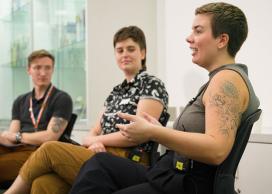Research in focus: Shannon Ward
Learn more about the work of our researchers at UBC

October 5, 2020
Name:
Shannon Ward
Title:
Assistant Professor
Department/Unit:
Community, Culture, and Global Studies
Are you Faculty or Staff?
Faculty
Location:
Okanagan
What year did you start working at UBC?
2019
Provide an overview of your research in 75 words or less:
Shannon Ward is a linguistic anthropologist who studies children’s language socialization, with a focus on greater China, Tibet, and the Himalaya. For over ten years, she has conducted comparative research on multilingual children’s everyday language practices in rural and urban communities in western China and North America. At UBC, she is aiming to understand how we can best support immigrant and diasporic children’s maintenance of their mother tongues as they age.
What first motivated you (or motivates you) to conduct your research?
I studied abroad in India when I was in high school. This was my first experience learning new languages through full immersion, and I became passionate about understanding how we can celebrate linguistic diversity. I also love working with young children. When I entered university, I discovered linguistic anthropology as the field that best unites my passions for language learning with the holistic examination of children’s lives.
What do you hope will change as a result of this research?
On a community level, I hope that families can better understand their own children. I audio-video record children’s everyday interactions over developmental time, which shows us how much children already know about their social and cultural worlds. On a broader scale, I hope that my research will help us continue to prioritize multilingualism in Canada. Children can teach us how to take creativity and innovation as a starting point for language learning and revitalization.
What have you learned during your research that has surprised you the most?
What has most surprised me is the insight that even very young children display in response to their social environments. While we think of children’s lives as being a-political, or somehow removed from the struggles that we engage in as adults, children show attentiveness to our same concerns about survival, inequity, and justice from their earliest interactions. Further, our own existential anxieties influence how we interact with and respond to our children.
Describe any interesting research milestones you are approaching?
I have begun examining multilingualism in early childhood among communities here in BC. My research team is documenting linguistic diversity among immigrants from China to the Okanagan. We are also starting SSHRC-funded research on the language learning pathways of the first generation of Tibetan children born in Canada. We are dynamically adapting our research methods to COVID-19 by training parents to document their children’s language use at home.
- Our people
- Research
- Research in focus






